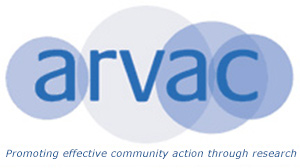ARVAC and me - Jayne Humm
When did you become a member of ARVAC and why?
I became a member of ARVAC when I worked for the Community Development Foundation- that must have been about the late 1990s. I joined because there weren’t at the time- and there still isn’t- many networks involving researchers in the charity sector or voluntary and community sector. Very often in this sector there are lone researchers working on their own and I think this is growing now with funding cuts. If you’re a lone researcher in an organisation then it becomes a bit lonely, so it can be quite nice to have your peers to interact with. That’s why I joined.
What have you come across recently that you think would be of interest to ARVAC members, researchers or practitioners in the community and voluntary sector?
Something that I think is of interest is the formation of the institute for community studies which is a new venture (launching in September) that has just managed to get some funding and some new staff. It’s an interesting body that is being housed at the Young Foundation. It’s interesting because it really does give credence to the sorts of issues that communities really care about and it’ll be doing research about those very issues. I am on the advisory group and we’re just talking about how we might surface some of the issues that the institute will look at and research in the first instance. I think it’s an exciting new venture.
What do you think are the challenges or opportunities facing research in the voluntary and community sector?
I think that in the professionalised sector – in the voluntary organisations and charities that employ researchers- there’s a bit of a skills gap because there aren’t so many people… employed in research in the sector anymore. It’s quite hard to recruit, especially at a senior level. That’s a challenge. About 10 - 15 years ago, there were enough people employed in research in the sector that there was a little bit of movement and people could have a good career progression.
I think there are huge number of opportunities for people at community level to do community research, more than before, ironically (whether that is always paid is another question). I think that there is more interest now in what communities think. I don’t really want to talk about Brexit, but I think Brexit and generally people, especially politicians, feel that they don’t really understand communities and communities feel very much that politicians don’t understand them. I think there’s a renewed interest in trying to ensure that communities get a voice and research can help with that. This is why we’re having this conference in November (Uncover> Action) to look at research with and in communities and about how that brings about change.
When are you happiest?
I’m happiest when I am sitting in my little garden, having done a bit of gardening and helped to nurture these little plants. I’m sitting there with a nice captain morgans and diet coke with plenty of ice, thank you very much!
Jayne Humm is head of research and learning at Local Trust and Chair of ARVAC
